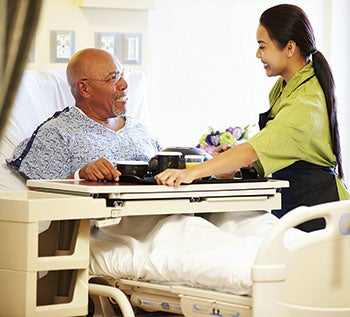Study assesses efficacy of self-disinfecting coating
 |
| PHOTO BY MONKEYBUSINESSIMAGES/THINKSTOCK SurfaceWise can reduce the total number of bacteria on hard surfaces such as tray tables. |
A new “self-disinfecting” coating designed for hospitals and other settings reportedly can reduce the total number of bacteria and antibiotic-resistant bacteria more than 15 weeks after application.
The antimicrobial coating, called SurfaceWise from Allied BioScience of Dallas, was found to produce long-term efficacy in a 24-bed intensive care unit (ICU) at a Southern California hospital. Findings from this study, conducted between May 10 and Sept. 30, 2013, were published in the November 2014 issue of the American Journal of Infection Control.
The study’s authors note that the product is a formulation of a quaternary ammonium organosilane compound that binds to surfaces and produces residual disinfecting benefits.
Researchers from the University of Arizona’s department of soil, water and environmental science, Tucson, reported that their initial laboratory work demonstrated [the coating’s] effectiveness against a wide range of pathogenic bacteria, including methicillin-resistant Staphylococcus aureus (MRSA), Pseudomonas aeruginosa, and such viruses as MS-2.
In the study, various hard surfaces like beds, tray tables, bed rails and walls were cultured before surface treatment and then at one, two, four, eight and 15 weeks after application of the coating, which is applied electrostatically after routine surface cleaning has been performed.
Samples were cultured for total bacteria as well as Clostridium difficile, MRSA, vancomycin-resistant Enterococcus, and carbapenemase-producing carbapenem-resistant Enterobacteriaceae. The average bacteria count on all treated surfaces was reduced by >99 percent (2 logs) for at least eight weeks after treatment. Bacterial numbers did increase between eight and 15 weeks post-treatment, but the average bacterial count on all treated surfaces was <90 percent (1 log) after 15 weeks.
Michael Ruley, CEO of Allied BioScience, says the friction from routine surface cleaning can erode the coating over time and necessitate reapplication after several months. He adds that research will be published soon detailing the clinical results from the study.



